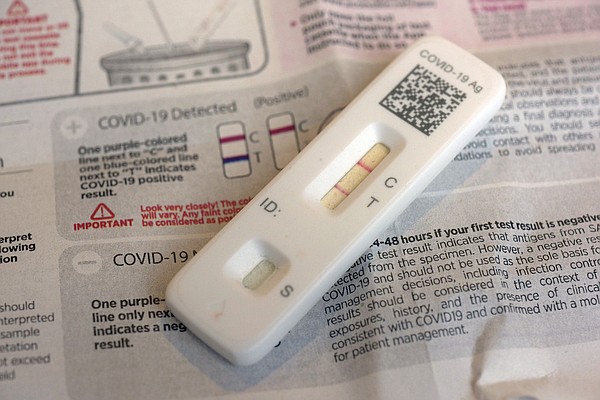Infection
Covid-19 infections increase in state; increase attributed to rise in travel during the summer
em {
display: contents !important;
}
label em {
display: none !important;
}
.photo {
width: 100%;
max-width: 50rem
}
a.fr-file {
color: #0274b7 !important;
}
Arkansas is once again seeing a summer uptick in covid cases, although recorded infections, hospitalizations and deaths remain low compared with previous years.
During the seven-day span ending Friday, 826 people had covid-19 infections that were reported to the state, an average of 118 per day, according to data from the state Department of Health’s website.
During all of July, the state averaged about 67 cases per day, up from approximately 57 a day in June.
The numbers represent a fraction of the total infections since many people use home test kits without reporting the results to the Health Department or are never tested.
“We’re really just relying on people that are ill enough to end up in hospitals or in clinics being tested,” Dr. Robert Hopkins, director of the internal medicine division at the University of Arkansas for Medical Sciences, said.
“We don’t have the level of testing we had last summer or the summer before, so we may have exactly as much disease now as we had then; we’ve just got a lot less testing.”
He attributed the recent uptick in infections to a rise in travel during the summer months.
“Part of it is the fact that we’re seeing very little precautions around covid in our communities,” Hopkins said.
“We see an awful lot of people traveling right now, and, talking to friends and family that have traveled in the last few months, almost nobody that’s traveling is wearing a mask.”
Most Arkansans also have not rushed to take advantage of the updated vaccines that the U.S. Food and Drug Administration authorized in September for use as booster doses.
Adults and children age 6 and older are considered “up to date” on their vaccines if they have received at least one dose of one of the updated vaccines, which target the original coronavirus strain as well as two strains of the omicron variant that were responsible for most infections last summer.
Younger children are considered up to date when they have received the number of doses recommended for their age group, including at least one dose of updated vaccine.
People who are unable or choose not to get a vaccine from Moderna or Pfizer, which make the updated vaccines, can also be up to date on their vaccines if they get the recommended doses of the Novavax vaccine, which uses a different technology than the Moderna and Pfizer vaccines.
According to the U.S. Centers for Disease Control and Prevention, only 11.6% of Arkansans were considered “up to date” on their vaccines as of June 30.
“The number of people that got the bivalent booster vaccine, starting last September, has been very low, and so we expect that levels of immunity among our population are probably fairly low,” Hopkins said.
New vaccines targeting additional strains of the virus are expected to become available this fall, according to the CDC.
Dr. Marti Sharkey, the health director for Fayetteville, said people who are at high risk for serious illness from covid-19 should get up to date on their vaccines as soon as possible.
For others, “I would recommend waiting for the variant specific booster this fall when they get their flu vaccine,” she said.
Dr. Gene Shelby, Garland County’s health officer, had some additional advice for curbing infections.
“The main precaution is if you’re sick, stay home, whether it be a covid-related virus or not,” he said.
According to a “weekly update” on the Health Department’s website last week, 15 people had been hospitalized with covid-19 in the state in the past seven days.
The CDC’s website listed the state as having an average of about 36 covid-19 patients in the state’s hospitals on any given day during the week ending July 22, the most recent period for which data was listed.
The number had generally been on the decline since it reached a peak of 364 the week ending Jan. 7, during a spike in infections over the winter.
Last summer, the number in hospitals on any given day peaked at an average of 360 the week ending July 23, 2022.
“Most of the patients who have been hospitalized with covid are either older adults or have compromised immune systems,” Hopkins said.
The Health Department’s website lists Arkansas as having 13,204 deaths from covid-19 since the start of the pandemic, including 3,409 last year and 385 so far this year.
Of this year’s deaths, 326 have been among people 65 and older, according to the site. The weekly update on the site lists the state as having no covid-19 deaths in the past seven days.
Ly is a Report for America Corps member.

